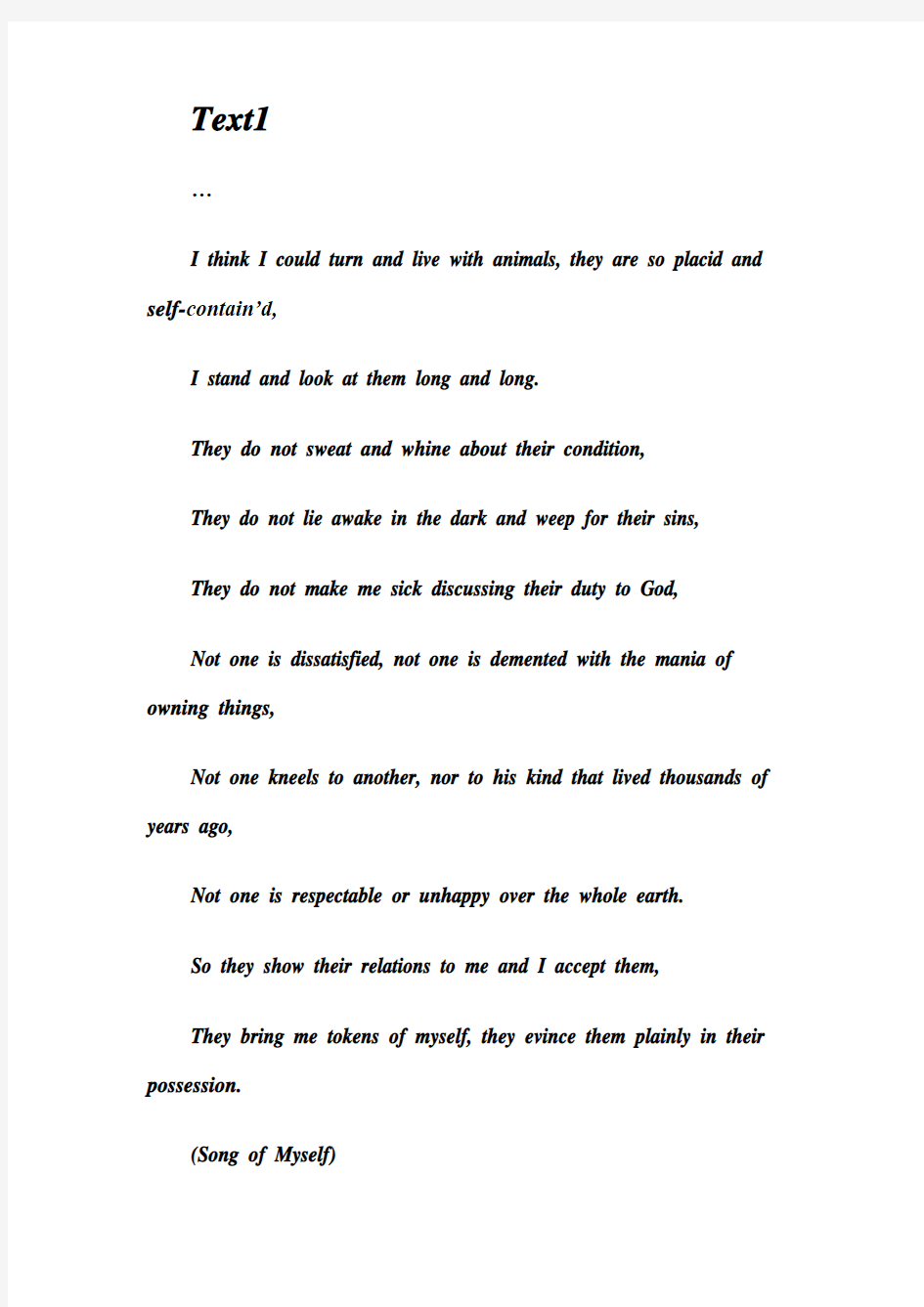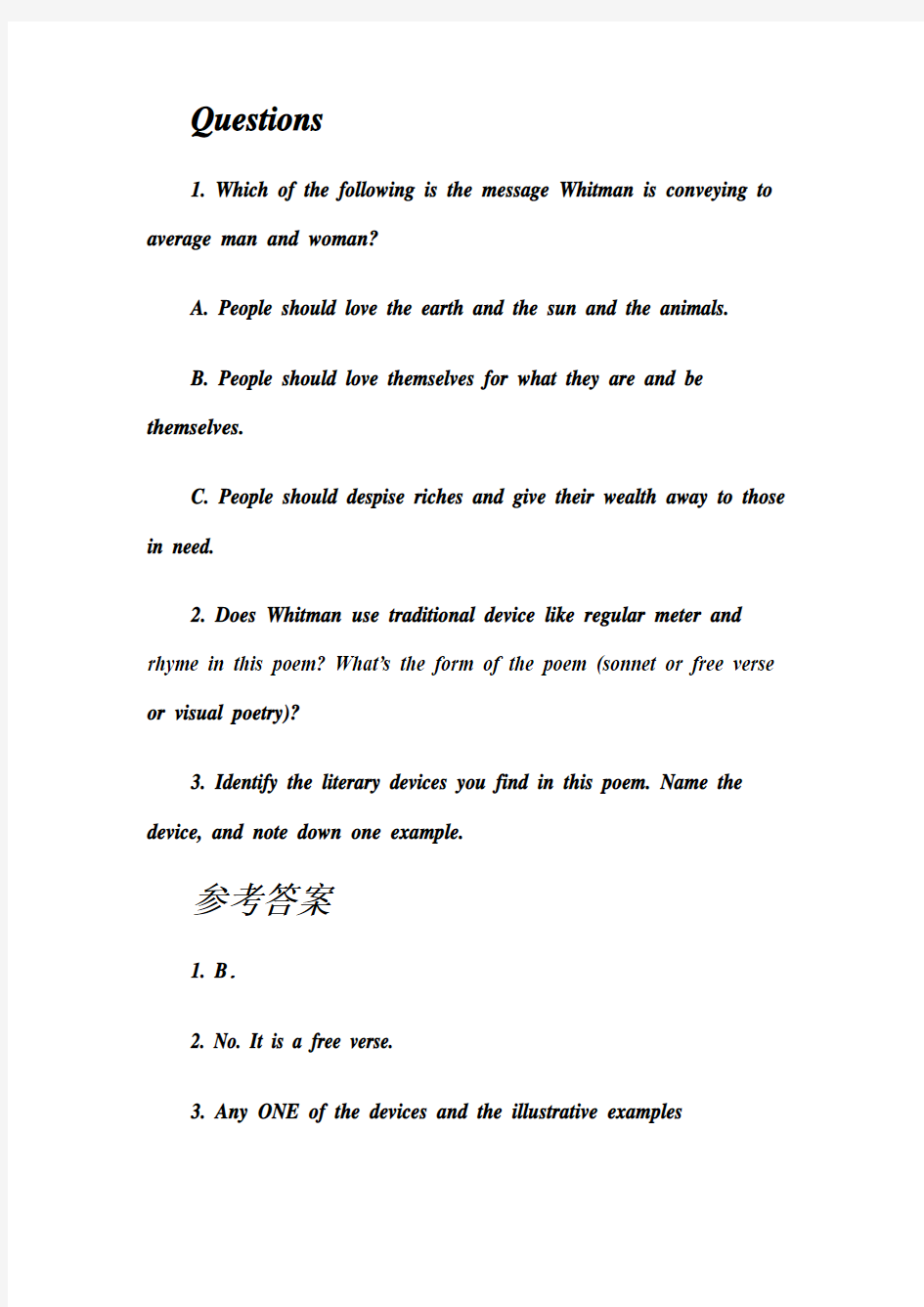

Text1
…
I think I could turn and live with animals, they are so placid and self-contain’d,
I stand and look at them long and long.
They do not sweat and whine about their condition,
They do not lie awake in the dark and weep for their sins,
They do not make me sick discussing their duty to God,
Not one is dissatisfied, not one is demented with the mania of owning things,
Not one kneels to another, nor to his kind that lived thousands of years ago,
Not one is respectable or unhappy over the whole earth.
So they show their relations to me and I accept them,
They bring me tokens of myself, they evince them plainly in their possession.
(Song of Myself)
Questions
1. Which of the following is the message Whitman is conveying to average man and woman?
A. People should love the earth and the sun and the animals.
B. People should love themselves for what they are and be themselves.
C. People should despise riches and give their wealth away to those in need.
2. Does Whitman use traditional device like regular meter and rhyme in this poem? What’s the form of the poem (sonnet or free verse or visual poetry)?
3. Identify the literary devices you find in this poem. Name the device, and note down one example.
参考答案
1. B.
2. No. It is a free verse.
3. Any ONE of the devices and the illustrative examples
Repetition:
They do not sweat and whine about their condition,
They do not lie awake in the dark and weep for their sins,
They do not make me sick discussing their duty to God…
Parallelism and repetition:
Not one is dissatisfied, not one is demented with …
Not one kneels to another, nor to his kind that lived thousands of years ago,
Not one is respectable or unhappy over the whole earth.
Text 2
Stop all the clocks, cut off the telephone
Stop all the clocks, cut off the telephone,
Prevent the dog from barking with a juicy bone.
Silence the pianos and with muffled drum
Bring out the coffin, let the mourners come.
Let aeroplanes circle moaning overhead
Scribbling on the sky the message He Is Dead,
Put the crepe bows round the white necks of the public doves, Let the traffic policemen wear black cotton gloves.
He was my North, my South, my East and West,
My working week and my Sunday rest,
My noon, my midnight, my talk, my song;
I thought that love would last for ever: I was wrong.
The stars are not wanted now: put out every one;
Pack up the moon and dismantle the sun;
Pour away the ocean and sweep up the wood.
For nothing now can ever come to any good. Questions
1. These stanzas are taken from _________ by _________.
A. Ballad of Reading Gaol…Oscar Wilde
B. Stop all the clocks, cut off the telephone … W.H. Auden
C. Wild Nights! Wild Nights!… Emily Dickinson
2. The poem can be categorized as ________.
A. an elegy
B. a ballad
C. a sonnet
3 . What’s the focus of the third stanza?
A. The celebration of the importance of the loved one to the poet.
B. The difficulties in making decisions at the crossroads of life.
C. The destructive force of envy and despair.
4. The speaker expressed _______.
A. bitter disappointment at his neighorhood’s polluted environment
B. deep grief at the death of a friend /lover
C. strong desire to change the world
参考答案
1. B
2. A
3. A
4.B
Text 3
The Road Not Taken
Two roads diverged in a yellow wood,
And sorry I could not travel both
And be one traveler, long I stood
And looked down one as far as I could
To where it bent in the undergrowth;
Then took the other, as just as fair,
And having perhaps the better claim,
Because it was grassy and wanted wear;
Though as for that, the passing there
Had worn them really about the same,
And both that morning equally lay
In leaves no step had trodden black.
Oh, I kept the first for another day!
Yet knowing how way leads on to way,
I doubted if I should ever come back.
I shall be telling this with a sigh
Somewhere ages and ages hence:
Two roads diverged in a wood, and I —
I took the one less traveled by,
And that has made all the difference. Questions
1. The poem is set _______.
A. by a fork in the road in a yellow wood
B. on a train to a distant city
C. by a country road to a big city
2. The speaker begins the poem by __________.
A. describing himself walking down a garden path
B. describing himself standing by diverging roads
C. commenting on the meaninglessness of life
3. What is the speaker’s initial response to the divergence of the two roads?
A. He sighs bitterly.
B. He got excited.
C. He was sorry.
4. The pattern of rhyme schemes used in the poem is _______.
A. abaab
B. acabac. abbac
5. What might be the symbolic meaning of the two roads?
A. The conflicts between man and nature.
B. The difference in simple country life and rich city life.
C. The different paths we take in life.
6. Which of the following is true of the poem?
A. The poem has a slow rhythm and it suits the contemplative mood of the speaker.
B. The poem has a fast rhythm and it creates a cheerful atmosphere.
C. The poem has no regular rhythm to speak of.
1. A
2.B
3. C
4.A
5. C
6. A
Text 4
Love Your Enemy
Brought you here in slave ships and pitched over board. Love your enemy.
Language taken away, culture taken away.
Love your enemy.
Work from sun up to sun down.
Love your enemy.
Work for no pay.
Love your enemy.
Last hired, first fired.
Love your enemy.
Rape your mother.
Love your enemy.
Lynch your father.
Love your enemy.
Bomb your churches. Love your enemy.
Kill your children.
Love your enemy.
Forced to fight his wars. Love your enemy.
Pay the highest rent.
Love your enemy.
Sell you rotten foods. Love your enemy.
Sell dope to your children. Love your enemy.
Forced to live in the slums.
Love your enemy. Dilapidated schools. Love your enemy.
Puts you in jail.
Love your enemy. Bitten by dogs.
Love your enemy. Water hose you down. Love your enemy. Love.
Love.
Love.
Love.
Love.
Love for everybody else.
But when will we love ourselves?
(Yusef Iman.)
Questions
1. The poem can be categorized as ________.
A. a narrative poem
B. an elegy
C. a protest poem
2. One prominent device the poet uses in this poem is _____
A. irony
B. alliteration
C. personification
3. Which of the following is true of the poem?
A. The writer wants to expose the hypocrisy of the injustice to the black people.
B. The poem reveals the writer’s feelings of guilt through repeating the line ‘Love your enemy’.
C. The writer calls on the white employers to give equal pay for equal work.